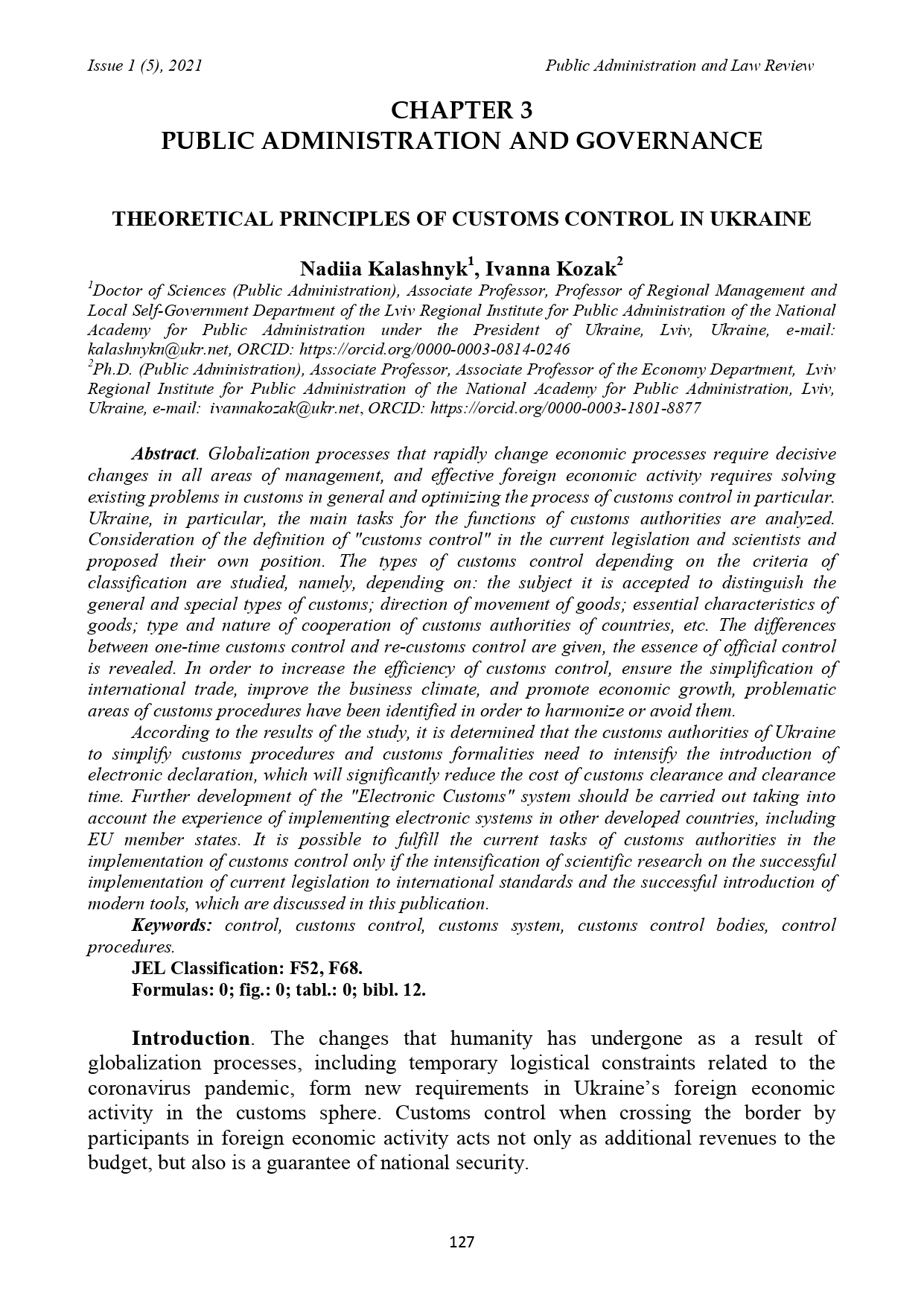THEORETICAL PRINCIPLES OF CUSTOMS CONTROL IN UKRAINE
DOI:
https://doi.org/10.36690/2674-5216-2021-1-127Abstract
Globalization processes that rapidly change economic processes require decisive changes in all areas of management, and effective foreign economic activity requires solving existing problems in customs in general and optimizing the process of customs control in particular. Ukraine, in particular, the main tasks for the functions of customs authorities are analyzed. Consideration of the definition of "customs control" in the current legislation and scientists and proposed their own position. The types of customs control depending on the criteria of classification are studied, namely, depending on: the subject it is accepted to distinguish the general and special types of customs; direction of movement of goods; essential characteristics of goods; type and nature of cooperation of customs authorities of countries, etc. The differences between one-time customs control and re-customs control are given, the essence of official control is revealed. In order to increase the efficiency of customs control, ensure the simplification of international trade, improve the business climate, and promote economic growth, problematic areas of customs procedures have been identified in order to harmonize or avoid them.
According to the results of the study, it is determined that the customs authorities of Ukraine to simplify customs procedures and customs formalities need to intensify the introduction of electronic declaration, which will significantly reduce the cost of customs clearance and clearance time. Further development of the "Electronic Customs" system should be carried out taking into account the experience of implementing electronic systems in other developed countries, including EU member states. It is possible to fulfill the current tasks of customs authorities in the implementation of customs control only if the intensification of scientific research on the successful implementation of current legislation to international standards and the successful introduction of modern tools, which are discussed in this publication.
Downloads
References
Berezhnyuk I.G. (2009). Customs regulation of Ukraine: national and international aspects. Academy of Customs Service of Ukraine. 543 p.
Betsenko M.A., Toloshnyak V. (2019). Pragmatism of customs control and customs clearance of vehicles in Ukraine. Economics and customs relations. No. 9-10. p. 72-81.
Community Customs Code: Regulation (EU) No 450/2008 of the European Parliament and of the Council: of 23 April 2008. URL: http://kompmp.rada.gov.ua/.
Customs Code of Ukraine No. 4495-VI of March 13, 2012. URL: http://zakon3.rada.gov.ua/laws/show/4495-17.
Dermanska L.V. (2018) Custom control optimizationfor providing efficiency of foreign economic activity. Innovative economy. №1-2. p. 5-10.
Dyomin Y. M., Dyomina S. Y., Zheleznyak N.M. (2009). Customs law of Ukraine. Center for Educational Literature. p. 136.
Goncharuk O.A. (2011). Features and ways to improve customs post-audit. South Ukrainian Law Journal. No. 3. p. 303-305.
Holynskyy Y., Hrynyk I. (2019). Customs control in Ukraine and ways of its improvement. «Young Scientist». No 10 (74). p. 646-650.
Ivancha I.I. (2009). The role of the customs service in the development of state financial control of customs receipts. Bulletin of Tomsk State University. № 319. p. 143-144.
Koval N. (2019). Customs austoms authorities’ involvement into official control. Lex Portus. No 6 (20). р. 7-28.
Martinyuk V.P. (2010). On the expediency of using the term "customs system of the state". Customs security. № 2. p. 144–149.
The Institute of Authorized Economic Operator. UNIAN News Agency has been introduced in Ukraine. URL: https://www.unian.ua

Downloads
Published
How to Cite
Issue
Section
License
Copyright (c) 2021 “Scientific Center of Innovative Researches” OÜ

This work is licensed under a Creative Commons Attribution 4.0 International License.





